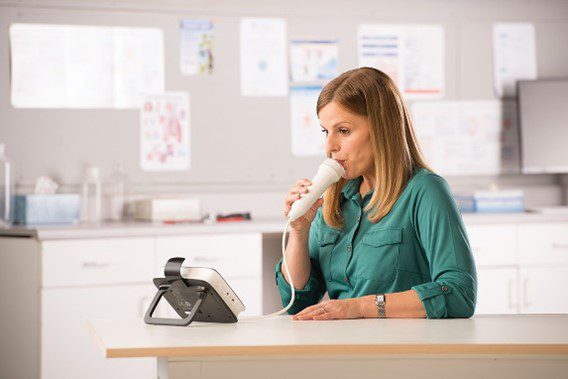Dr Andy Whittamore, GP, Clinical Lead Asthma + Lung UK and British Lung Foundation and joint FeNO national clinical lead & Dr Hitasha Rupani, Consultant Respiratory Physician, University Hospital Southampton NHS Foundation Trust and Asthma Biologics Clinical Champion.
Asthma is one of the most common long-term health conditions in the UK with 5.4million people living with the respiratory condition. It has a significant impact on the lives of those with asthma, as well as their families, particularly for the 200,000 people with severe or uncontrolled asthma. Many are frequently admitted to hospital as an emergency and run the risk of serious side-effects from extended periods on high dose steroid-based medication.
The NHS also spends £1.1billion treating and caring for people with asthma annually, with around 90% spent on medicines.
It is estimated that around 30% of people with asthma might not have the correct diagnosis. That is a lot of people taking medicines that might cause harm, cost the NHS millions of pounds and has a significant impact on the environment. This also means that these patients may have symptoms that are not getting the treatment that they need.
By providing access to improved technologies to diagnose and manage asthma, as well as life-changing new treatments, we can transform the lives of patients and support the NHS to improve care and reduce costs.
FeNO: Improved access to innovative diagnostics and management
Asthma diagnosis is like a jigsaw. As well as gaining a good clinical history and examination of the patient, you also need objective evidence to support diagnosis. This includes evidence of airflow obstruction with spirometry or peak flow and evidence of airway inflammation through Fractional exhaled Nitric Oxide (FeNO) tests.
On their own, all of these tools are unreliable. But, when used together, we can have a greater certainty about the accuracy of how we diagnose and label people with asthma, so that they may get the treatment they need and not the ones that they don’t. Historically, FeNO has been widely used in secondary and tertiary care, but there has been limited adoption in primary care. AHSNs have been supporting their local clinical teams and health systems to adopt FeNO testing in primary care and increase access to this part of the diagnosis jigsaw.
FeNO helps to inform clinical decision making and enables more people to get the right treatment and care for their condition. It’s quick, it’s easy to perform and gives results in seconds, supporting our conversations with patients about their care.
For example, FeNO helps to identify whether a patient’s symptoms are being driven by eosinophilic inflammation, and whether they will benefit from optimising their inhaled steroid medication. For some, FeNO has led to better preventative treatment to treat their asthma, for others it helps shine a light on other causes for my patient’s symptoms. It can help us to confidently adjust somebody’s treatment so that people with asthma get the right treatment and are not prescribed more expensive medicines with more side effects unless they really need them.
For patients, FeNO is helping them to understand what is going on in the lungs when they have asthma. Speaking to them about their FeNO score and what it means is helping with conversations about adherence, good inhaler technique and whether we need to increase or decrease their steroid dose.
Inhalers account for about 3% of the NHS carbon footprint or 13% of primary care’s carbon footprint. FeNO testing can help us to optimise a person’s inhaler use and reduce the impact of asthma on the environment – by not prescribing inhalers for those who don’t need them, by not increasing inhaler doses for people who have symptoms but haven’t got evidence of airway inflammation, and it gives us better disease control which means that they use less of reliever inhalers such as salbutamol.
In just 18 months, we have seen a transformative approach to the use of FeNO testing in primary care with about 146,000 patients benefiting FeNO testing. There are now hundreds of additional FeNO devices in use across services in England, meaning more patients have quick access to simple and accurate testing.
Asthma Biologics: Improved access to innovative treatments for patients with severe or uncontrolled asthma
Severe asthma is a complex condition that can lead to a poor quality of life for patients. Up to 200,000 people are living with severe or uncontrolled asthma which does not respond to regular treatment, and many are frequently admitted to hospital or experience serious side-effects from extended periods on high-dose steroids.
Severe asthma is also associated with very high healthcare costs due to medication use, emergency treatment healthcare and management of oral steroid-related adverse events.
New NICE-approved biological therapies work in a targeted way by disrupting pathways causing airways inflammation, helping to manage symptoms and reduce relapses. These therapies can transform patients’ lives by reducing long-term side effects of other treatments, such as steroids, and reduce the number of life-threatening asthma attacks.
It is estimated that in England over 60,000 patients currently living with severe asthma would benefit from an asthma biologic. However, prescribing data suggests that only 8-10,000 of these patients are currently able to access these treatments.
By increasing access to asthma biologics patients can have an improved quality of life with fewer asthma attacks, asthma-related hospital admissions and side-effects of other treatments.
AHSNs are working with local health systems to support improvements in asthma pathways to ensure that more patients can receive specialist care and access asthma biologics.
Within the first year of the programme, more than 2,000 new patients began receiving life-changing biologic therapies. Fewer patients are now needing on high-dose oral steroids and living with the side-effects that come with these.
Training and resources
A big factor in the success of the FeNO and asthma biologic projects has been the development of toolkits with resources to help clinicians, patients and commissioners. The most popular parts of the toolkit are the free training for clinicians, alongside patient-facing resources and the commissioning tools to help with the implementation and delivery if both FeNO and asthma biologics.
If you are working in asthma and are keen to understand more about FeNO or Asthma Biologics, there are resources and training materials available to support you. The resources and information produced as part of the AHSN programmes can help shape vital discussions and guide the adoption of FeNO and Asthma Biologics into regular use in your services and lead to real improvements in outcomes for patients.
Read this Transforming asthma care through access to diagnostics and innovative treatments case study to find out more.

The government has set out three shifts it wants to see happen: treatment to prevention, hospital to community, analogue to digital. HealthTech has a crucial role in supporting the delivery of all three. But using technology to help deliver these changes requires procuring the technology, and when all the noise is about there being no [...]

Dr Anish Bhuva, is the founder of Pace MRI, a Consultant Cardiologist at Barts Heart Centre and an Associate Professor at University College London. Tell us about the innovation. What does it do, how does it help, who does it help and why is it important? Pace-MRI is an award-winning digital tool that manages complex [...]

As we celebrate International Women’s Day, Anna King, Commercial Director at Health Innovation Network South London, identifies how FemTech is 'Accelerating Action' in UK healthcare and driving economic growth. In recent years, FemTech - the sector focused on women’s health and wellness technology - has gained significant traction globally. In the UK, this growing sector [...]









